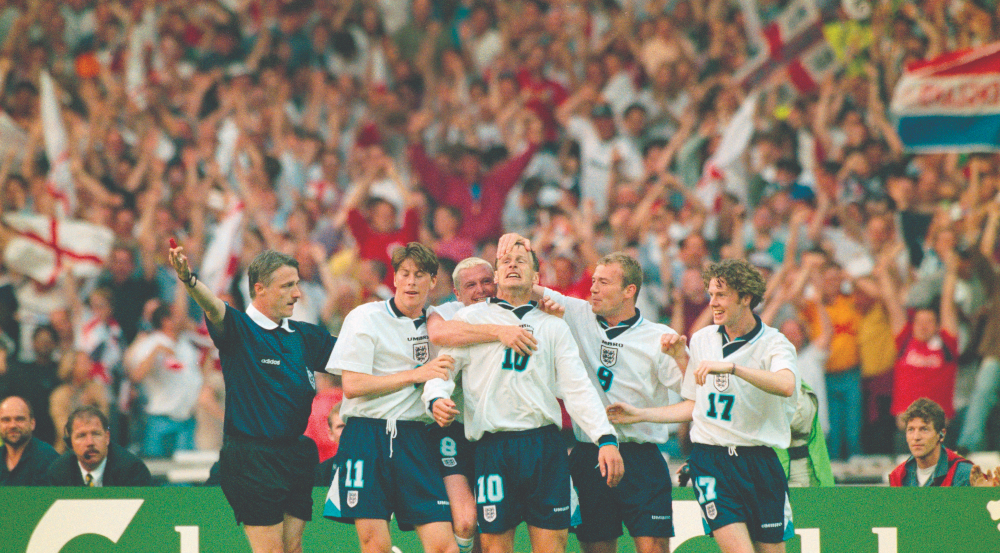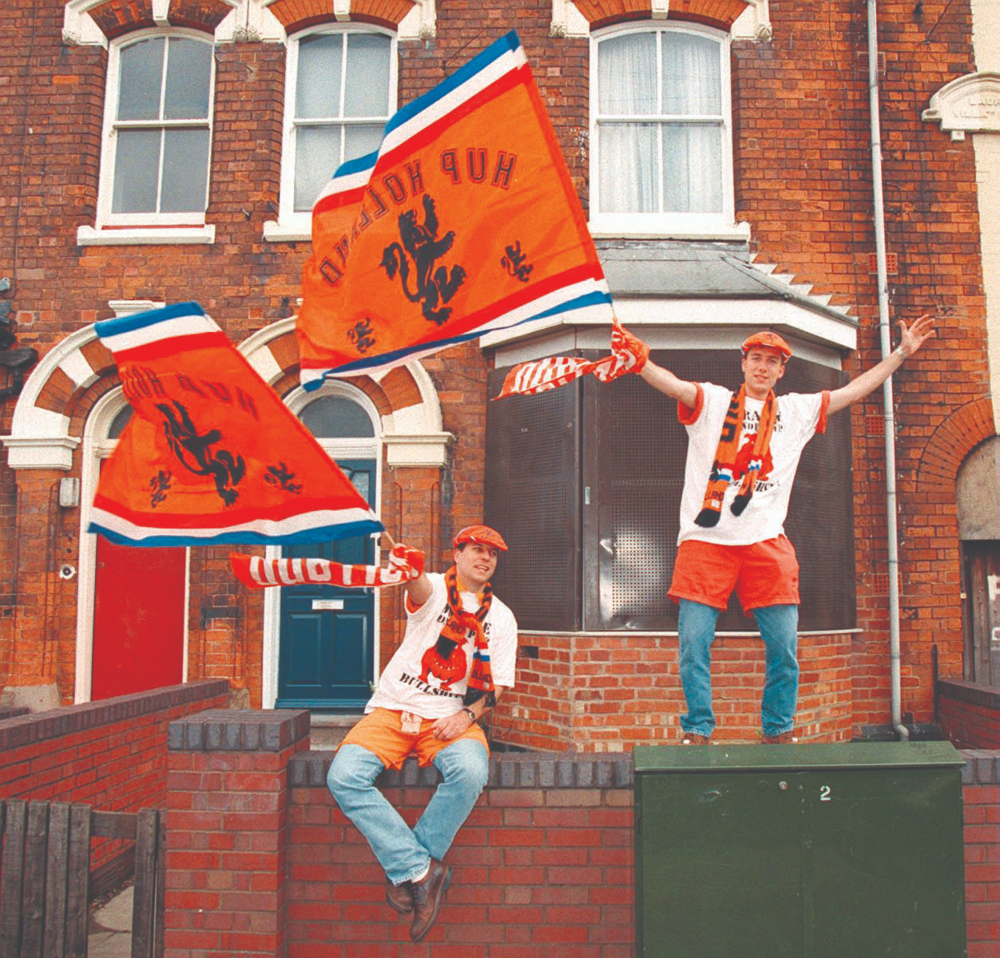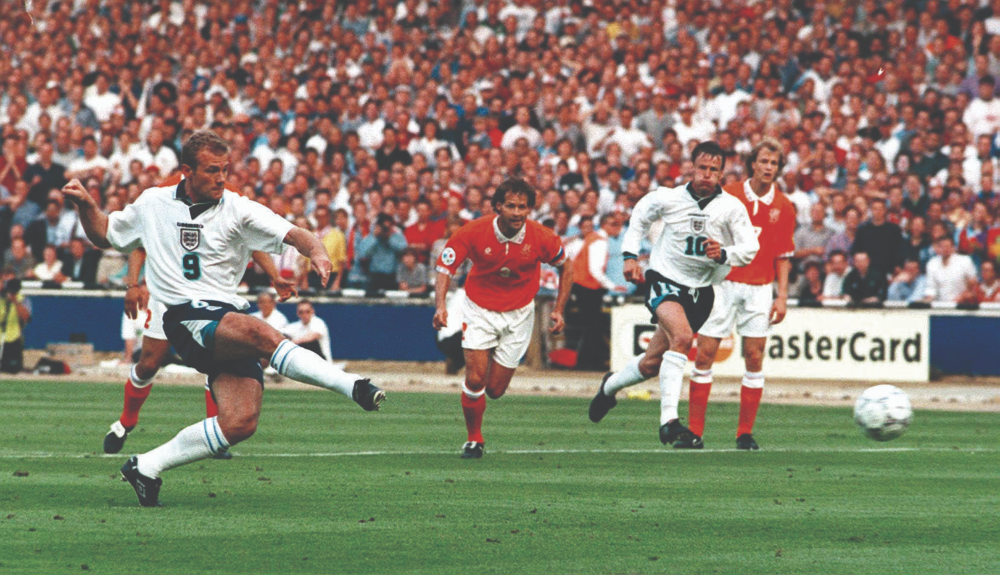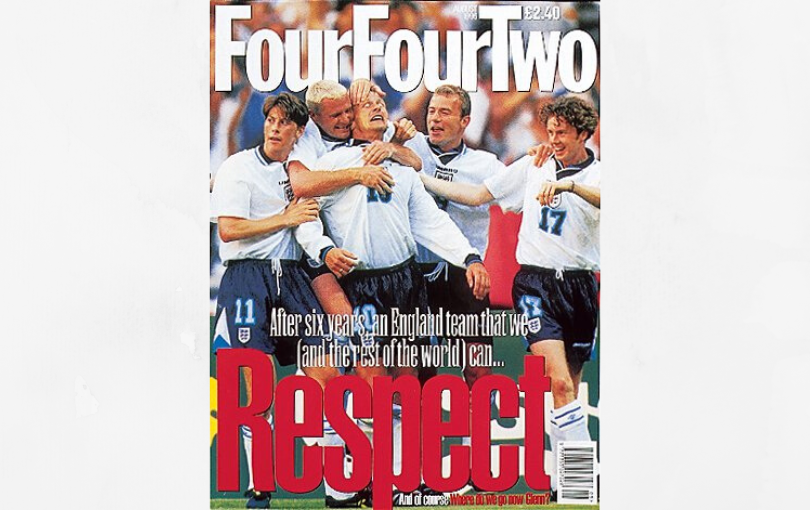
This is part four of this feature: Part 1 | Part 2 | Part 3 | Part 5 | Part 6
“You have to look at a side like Ajax, say they’re the best in the world and ask: ‘What can we learn?’ You can’t copy them, but you have to identify what we can use and what we can’t use.”
When Terry Venables spoke to FFT just before Euro 96, he was hardly giving the game away. England’s head coach had waxed lyrical about Dutch football “ever since my youth-team days”, and their influence had been noted – sometimes sarcastically, but mostly sympathetically.
After all, under his predecessor, Graham Taylor, England had regressed from the inconsistent but promising football of Italia 90 to a side of “Hit Les”, “Can we not knock it?” and a worryingly crucial role being played by Carlton Palmer. A long-ball side, in other words – and not even a good one.
Venables wasn’t anyone-but-Taylor: he was the anti-Taylor, designed to replace country-cousin parochialism with continental panache, because you don’t get to manage Barcelona by telling the lads to hoof it upfield for 90 minutes. He wanted players who were comfortable in possession and fluid in position – “a fusion of the best of English traditions with a Dutch influence,” explained Venables.
He had spent nearly two years coaching his men to play like the Dutch, when the Euro 96 draw destined them to face the real thing. As one of only four seeds, England were a little unlucky to be grouped with a country that had won Euro 88, been semi-finalists at Euro 92 and World Cup quarter-finalists in 1994, and whose ranks would be largely made up of the Ajax team that had just reached its second Champions League final in as many seasons. The Oranje had also destroyed Bobby Robson’s side at Euro 88, and effectively ended Graham Taylor’s tenure in Rotterdam five years later.
Yet there was discontent bubbling beneath the surface.
“Ajax were on top of Europe but there were issues within the squad,” midfielder Ronald de Boer tells FFT. “Going into the Euros, there was a disparity in wages, with players assigned into A, B and C categories. It caused tensions which got dragged into the national team as well, meaning there were some very grumpy faces. The focus wasn’t completely there, and then you can lose to any country.
A disgruntled Edgar Davids, dropped for the second fixture against Switzerland, had been sent home days before the England game for openly criticising his manager, Guus Hiddink.
Most importantly for the Three Lions, few people knew how the Dutch worked quite like Venables. And he had a plan.
“They liked to pass square,” reveals Paul Ince to FFT. “If they had it at the back, that wasn’t a problem, but as soon as they got to a certain area, we’d press them. Terry said, ‘They’ll start dropping back and we’ll start playing’.”
Despite beating Scotland with a back three, Venables reverted to 4-4-2 – the formation that had struggled against the Swiss.

It would be the same XI as in England’s first two games, after they had retained the same line-up just once in 18 friendlies. “You have to find ways of playing to suit your players and beat your opponents,” explained Venables. “It is no good just developing a Plan A; you need to come up with B and C as well.”
Hiddink’s side played a 3-4-3 with high wingers, so England’s full-backs dropped. “Terry was very astute and wanted us to be compact so that we could put maximum pressure on the Dutch,” said Steve McManaman, who was specifically charged with helping the front two whenever possible.
For his part, Venables calculated: “I was convinced they would be forced to play an extra defender, which would reduce their attacking threat. Until they adjusted, the Dutch had a dilemma – defences hate it if they don’t have a numerical advantage.”
Gareth Southgate would step back into the Three Lions’ backline... up to a point: he was detailed to mark Dennis Bergkamp. The BBC’s pre-game graphic displayed England’s starting XI against Scotland as a 3-1-1-3-1-1, which was not so much a formation as a telephone number. Now they would combine two solid banks of four with the attacking fluidity of their opponents. As Ince reminisces, “If you think about that game, it just went to perfection.”
Perfection started on a balmy midsummer’s Tuesday evening. Having made their way from Burnham Beeches through waving flags and cheering crowds, the squad learned that the group winners would meet Spain at Wembley, where England had played every game to that point, while the runners-up would face France at Anfield. Having scored more goals than the Dutch, England needed only a draw to top the group – but they’d do it in rather finer style.
Early Dutch possession rarely encroached on English territory, as per the plan.

“We started nicking a few balls, then got on the front foot,” recalls Ince. “All of a sudden, they started dropping back, as Terry had said they would. Once we started playing, they just couldn’t get the ball off us.”
England’s opening goal came from a Dutch corner. Anderton won an aerial duel with Jordi Cruyff, and Ince slipped the bouncing ball to Sheringham, deep in his own half. Taking his time despite a late Cruyff lunge at his ankles, Sheringham sent McManaman – going beyond the front two as instructed – scampering deep into the Dutch half. He waited for Ince, then slipped him a neat pass. England’s defensive midfielder flicked the ball behind his standing leg, and Danny Blind fouled him in the box.
When FFT mentions the penalty, Ince plays dumb: “Oh, I forgot about that… was that me? Funnily enough, I showed it to my son a year ago and he felt I dived! I said, ‘Thomas, son, in those days we didn’t dive – football’s changed a lot’. But yeah, that set us up really nicely.”
Did it ever. Unlike Gary McAllister’s spot-kick at the same end three days earlier, Shearer’s powerful penalty was never being saved, even with a 6'5" Edwin van der Sar at full Stretch Armstrong extension and guessing correctly.

“After that they went – you could just see it,” continues Ince. “They thought they could come to Wembley, big pitch, and play at their own pace. Once they couldn’t do that, they didn’t have a Plan B and we swamped them.”
It might have been so different had David Seaman not brilliantly denied his club-mate, Bergkamp, just before the break. The Oranje also won a whopping eight corners in the first half; Barry Davies felt obliged to say, 'England really need half-time here'.
Five minutes after the jaffa cakes, however, Sheringham nodded in Paul Gascoigne’s set-piece and the hosts had a two-goal cushion. “Against such a talented country, you think that if you don’t carry on scoring they can turn it around,” Sheringham tells FFT. “Tides turn very quickly.”
But better was to come just eight minutes later. Tony Adams intercepted a Dutch ball in the centre and thought about bursting forth, before wisely ceding possession to Gascoigne. The Geordie loped forward, wall-passing with Anderton, then McManaman, who sent him in at the corner of the 18-yard box. Wembley’s excited hubbub became an expectant roar as they imagined more Scotland-style magic. Sure enough, Gazza beat a man, but then he laid the ball to Sheringham, who’d drifted into a perfect pocket from which to pull the trigger.
“I could have had a shot if Alan wasn’t there but, seeing him out of the corner of my eye in a better position, only the pass felt right,” says Sheringham. “It was simply a case of picking your spot and hitting it,” deadpanned Shearer.
It was more than that. In just 20 seconds on the ball, England had probed, passed, dribbled, feinted and walloped. “And you have to say it’s magnificent,” Barry Davies told a gobstruck nation. Netherlands 0-3 England (Shearer 57).
Alan Shearer vs NetherlandsTuesday 18 June 1996Euro 1996 Group AEngland 4-1 Netherlands (Wembley, London) pic.twitter.com/hBdltjOwN9July 9, 2017
While Gascoigne danced in front of the Royal Box, McManaman’s face betrayed something like disbelief. But this was all part of the plan.
“That goal was perfect,” muses Sheringham. “We overloaded and found the extra man – that’s what you look for in a team with Macca, Darren, Gazza and Alan. It was an attacking formation that wanted to interact, pass and move. That was the beauty. You have to ask questions and Terry always asked questions.”

At 3-0, Barry Davies wondered aloud if one or both strikers should be protected from suspension, but both still had a part to play.
Five minutes after scoring his second and England’s third, Shearer bothered the ball off a defender and allowed Anderton to crack one from 20 yards. A deflection forced Van der Sar to spill it; Sheringham mopped up. Three goals in 12 minutes had destroyed the favourites.
Now Venables did make a substitution with suspensions in mind. Ince had received his second yellow card of the tournament, ruling him out of the now-inevitable quarter-final.
“David Platt came on for me – I was fuming,” says Ince. “I was effing and blinding, saying, ‘Hey, are you taking the piss? F**king hell!’ He [Venables] said, ‘But Incey, you’re suspended for the next game – I want to see how another player gets on.’ I said, ‘More f**king reason to keep me on!’ Even though it was such a great night for us, I wasn’t happy at the end.”
Neither were the Scots. They’d edged ahead of Switzerland at Villa Park and, with the Dutch now losing 4-0, were poised to sneak into the last eight.
But as England’s fans settled into party mode, Bergkamp sent substitute Patrick Kluivert gliding between defenders to convert through Seaman’s legs. “We got very lucky to score one, because 5-0 or 6-0 would have been more logical at that moment,” Ronald de Boer tells FFT. “It’s one of the most embarrassing defeats in my career – I was used to winning.”

Mild disappointment among England fans soon turned to schadenfreude as calculations confirmed that, by conceding, Venables’ team had accidentally pushed Scotland towards the exit door, unless Craig Brown’s men could net another.
They couldn’t, and sympathy was in short supply. “We didn’t know at the time, but when we found out in the dressing room it was hilarious,” says Sheringham, chuckling.
Despite saving their skins, the Dutch had still suffered their heaviest defeat for 20 years, and they couldn’t call it undeserved. To be fair, they didn’t. Bergkamp led the chorus of admiration: “Before the competition began, everyone was laughing about England and their style – they won’t be laughing now.” De Boer tells us now that, “We were totally blown away. It felt like a reality check which took us back to basics.”
If England’s win was surprising (FFT’s jokey ‘best-case scenario’ pre-tournament had them topping the group by drawing with the Dutch), the scoreline was so unexpected that it wasn’t even on Ladbrokes’ pre-match coupon.
For the elder statesmen in a revived squad, it was also payback for Rotterdam in 1993, when Ronald Koeman evaded a clear red card for a pull on Platt, before rumbling up the other end to score and effectively finish off England’s hopes of qualifying for USA 94. Ince was one of the Euro 96 squad’s five survivors from that night, and he still bristles at the mention of a match that made Graham Taylor – who had allowed a documentary crew to follow him – a pre-internet meme.
“Koeman should have been sent off and we would have qualified,” Ince tells FFT today, in a tone that suggests an argument would be unwise. “That killed me. It was in a couple of people’s minds that we wanted to exact a bit of revenge. And we did.”
The press were in raptures. 'England outplayed the Dutch in every area', wrote The Independent’s Glenn Moore. David Lacey of The Guardian admired Venables’ men not just beating the Netherlands but 'sweeping past them amid such a cannonade of goals'. Steve Curry enjoyed “a torrent of irresistible English play” (the Daily Express); Rob Hughes acclaimed the 'pace, passion and power' on 'the best night English football has known for many years' (The Times); and the Daily Mail’s Jeff Powell dared to compare, calling it 'The best since 1966'.
Recognition at last
While the press phoned through their hallelujahs, the protagonists mulled England’s potential. As assistant Bryan Robson recalls, “To take on a really good team and beat them so convincingly was the moment I knew this England squad was onto something special.”
Sheringham even goes two steps further. “It must be the highlight of my footballing life,” he says. “Everyone talks to me about 1999, winning the Treble, but for me it’s playing for England at Wembley, in a major competition, beating Holland 4-1 the way we did, scoring two goals and being made man of the match. It doesn’t get much better than that.”
Venables couldn’t help but enjoy the press reception, though perhaps the sweetest report came from his opposite number, Hiddink, who said: “We must recognise that they taught us a lesson in every sense of the game.”
Expected to breeze past the Swiss, narrowly outbox the Scots and then struggle against the Dutch, Venables’ England had done it in reverse and were settling into the tournament, like a proper grown-up contender. So, how far could they go?
This feature first appeared in the February 2020 issue of FourFourTwo - get the latest issue now.
This is part four of this feature: Part 1 | Part 2 | Part 3 | Part 5 | Part 6







